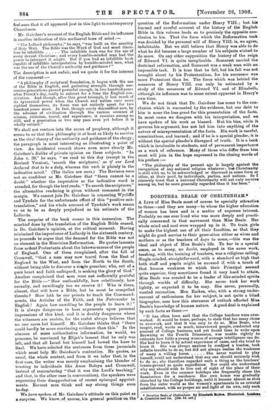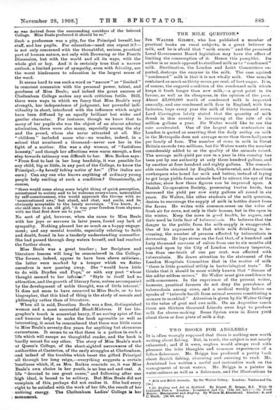DOROTHEA BEALE OF CHELTENHAM.* A LIFE of Miss Beale must
of course be specially attractive to those—and they are many—to_ whom the higher education
of women has been and is a matter of supreme interest. Probably no one ever lived who was more deeply and practi-
cally concerned in that movement than Miss Beale. Her whole mind and soul were wrapped up in it. To train girls to make the highest. use of all their faculties, so that they . might do good service to their generation either as wives and mothers or as the teachers of days to come,—this was the ideal and object of Miss Beale'a life. To her in a special sense, as to many, no doubt, employed in the same work, teaching, with the training of teachers, was a religious calling. Single-minded, straightforward, with a standard so high that both staff and pupils might be excused if, with a touch of that human weakness to which their . Principal seemed quite superior, they sometimes found it very hard to attain, Miss Beale was created to be a leader of like-minded spirits .
through worlds of difficulty. She never took her work lightly, or expected it to be easy. She never, personally, . wanted recreation. Mrs. Raikes, who, with a strong under- current of enthusiasm for her subject, is not quite a blind biographer, sees how this sternness of outlook affected Miss Beale's knowledge of human nature. A good deal is explained by such facts as these:—
"It has often been said that the College teachers were over- worked. It would be truer, perhaps, to state that too many chose to overwork, and that it was easy to do so. Miss Beale, who taught, read, wrote so much, interviewed people, conducted any amount of College business, and yet found time to write upon Browning or the Fourth Dimension, was unable rightly to. estimate how little a young woman of average intelligence can do. She had to learn it by actual experience of cases, and she tried to learn it. She was always anxious to readjust a burden, took infinite trouble to do so, but did not always realise the weakness of many a willing horse. . . . . . She never wanted to play herself, could not understand that any one should seriously wish to do so ; she therefore regarded such a thing as the teachers' tennis-ground as quite superfluous. Nor could she understand why any should wish to live out of sight of the place of their work. Even in the summer holidays she frequently chose the Sanatorium for a residence. Her, own house was gradually absorbed by the College buildings, until it became almost as Shut from the outer world as the women's apartments in an oriental establishment, with no proper air and light of its own, only such • Dorothea Baal. of Cheltenham. By Elizabeth /hikes. Eleshated. Loideas A. Constable and Co. [10e. 6d. net.I - - -
as was derived from the surrounding corridors of the beloved College. Miss Beale preferred it should be so."
Such' a preference • was a pity, for the Principal herself, her staff, and her pupils. For -education—need one repeat it ?— is not only concerned with the thoughtful, serious, practical part-of human nature, not only with Browning or the Fourth
Diniension, but with the world and all its ways, with the whole -girl or boy. And :it is certainly true that a narrow outlook, a limited power of sympathy, even with frivolity, are the'• worst hindrances to education in the largest sense of the word. • It'seema hard to use such a word as "narrow" or "limited" in remotest connexion with the personal power. talent, and goodness of Miss Beale; and indeed the great success of
Cheltenham College makes any such criticism futile. Still,
there were ways in which we fancy that Miss Beale's very strength, her independence of judgment, her powerful indi- viduality- in short, interfered with the influence which might have been diffused by an equally brilliant but wider and
gentler character. For instance, though we know that to many of her•pupils she was the object of an almost adoring
adMirittion, there were also many, especially among the shy and the proud, whom she never attracted at all. Her "children" included some who—no' wonder, indeed, in a
school that numbered a thousand—never saw her in the tight of a mother. She was a shy woman, of "fastidious honesty," and though her affections were warm enough, a first step towards intimacy was difficult to her. Mrs. Raikes says : From first to last in her long headship, it was possible for any child, big or little, in any part of the College, to know the Principal,—by herself taking notice of her." (The italics are owe.) 'Can any one who knows anything of ordinary young people help smiling at such a condition ? Occasionally, of course,
"there would Come along some bright thing of quick pereoption, accustomed to society and to be welcome everywhere, untroubled by self-consciousness, who would approach the throne with no ` unaccustomed awe,' but stand, and chat, and smile, and be obviously acceptable to the lonely sovereign. 'You know, A.,' she said once to an old girl, i it was your freedom from shyness with mo that first drew me to you."
No sort of girl, however, when she came to Miss Beale with her joys or sorrows in later years, found any lack of
sympathy. Nothing pleased her so much as a happy-engage- ment ; and any mental trouble, especially relating to faith and doubt, found in her a tenderly understanding counsellor.
She had passed through deep waters herself, and had reached the further shore.
Miss Beale was a great teacher ; her Scripture and literature lessons will long be remembered in the College.
The' former, indeed, appear to have been above criticism; the latter were marked by a temper which we flatter ourselves is now passing away. She "would have little to do with Dryden and Pope," or with any poet " whose thought seemed to her inferior." "Style in itself bad no attraction, and the growth of literary form, unless accompanied by the development of noble thought, was of little interest."
It does not seem to have occurred to Miss Beale, or to her biographer," that this kind of thin'g is the study of morals and philosophy rather than of literatnre.
When all is said, Dorothea Beale was a fine, distinguished woman and a most successful Head-Mistress. If her bio- grapher's touch is somewhat heavy, if no saving spice of fun and—humour helps to make the book agreeable as' well as interesting, it must be remembered that there was little room in Miss Beale's seventy-five years for anything but strenuous
-earnestness. It seems to us that there is a pathos in such a life which will escape no thoughtful reader, and the book is 'hardly meant for any other. The story or Miss Beale's work -at Queen's College, of the short-sighted narrowness of the -authorities at Casterton, of the early struggles at Cheltenham, :and 'indeed of the troubles which beset the gifted Principal thiough her long reign,—everything suggests a certain loneliness which, if, as Mrs. Raikes reminds us, it was Miss Beale's own choice in her youth, is no less sad and real. A life "devoted to one great cause,' and following after one
Ugh. ideal, is bound to be solitary. But Miss Beale did not -complain of this, perhaps did not realise it. She had every
—right to be satisfied with the work of her life, the result of her - :untiring energy. The Cheltenham Ladies College is her monuments



















































 Previous page
Previous page